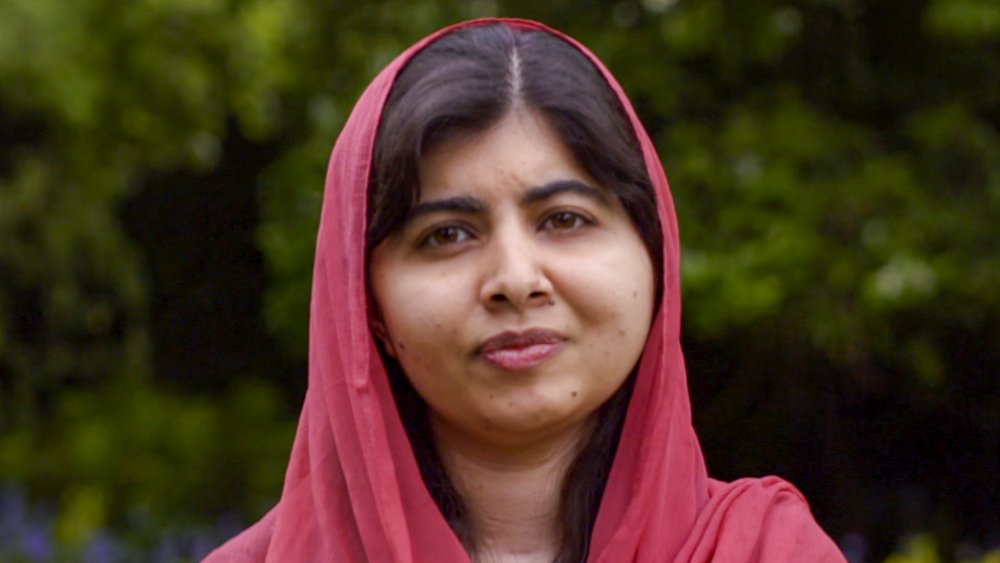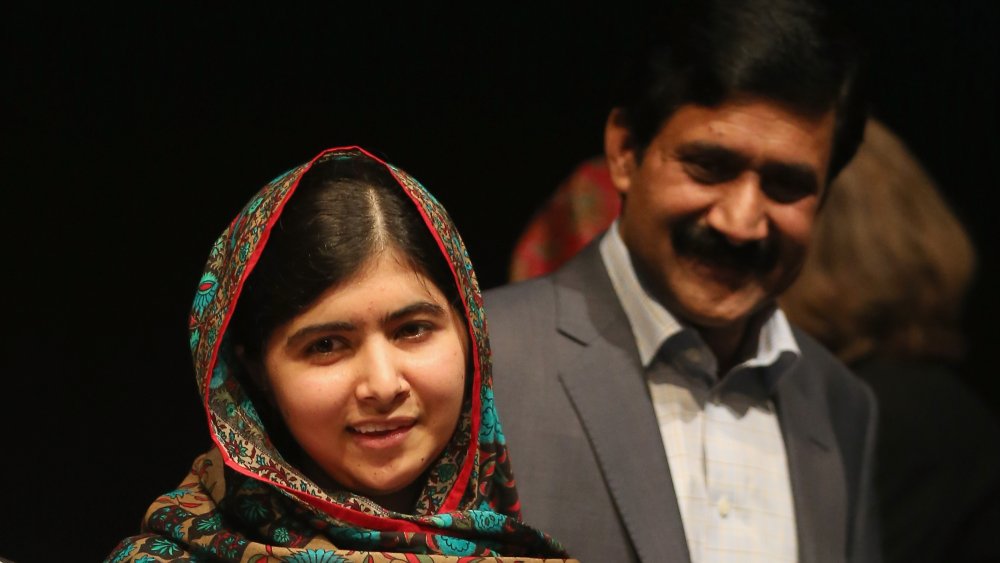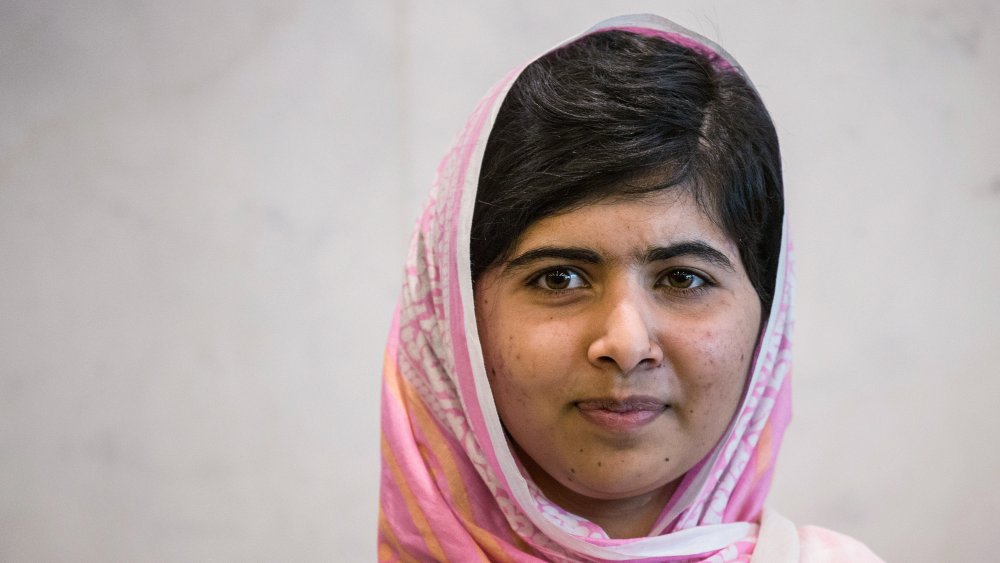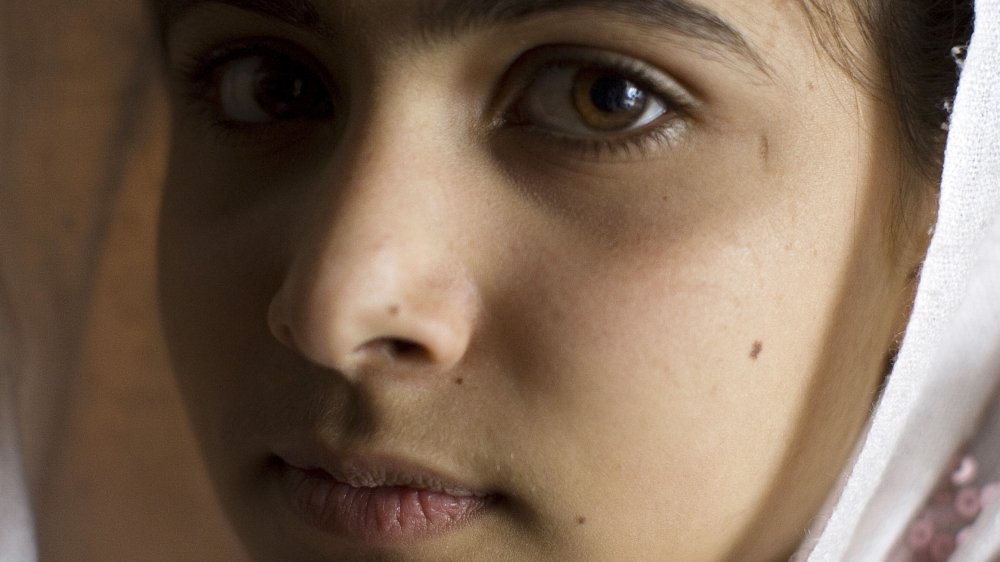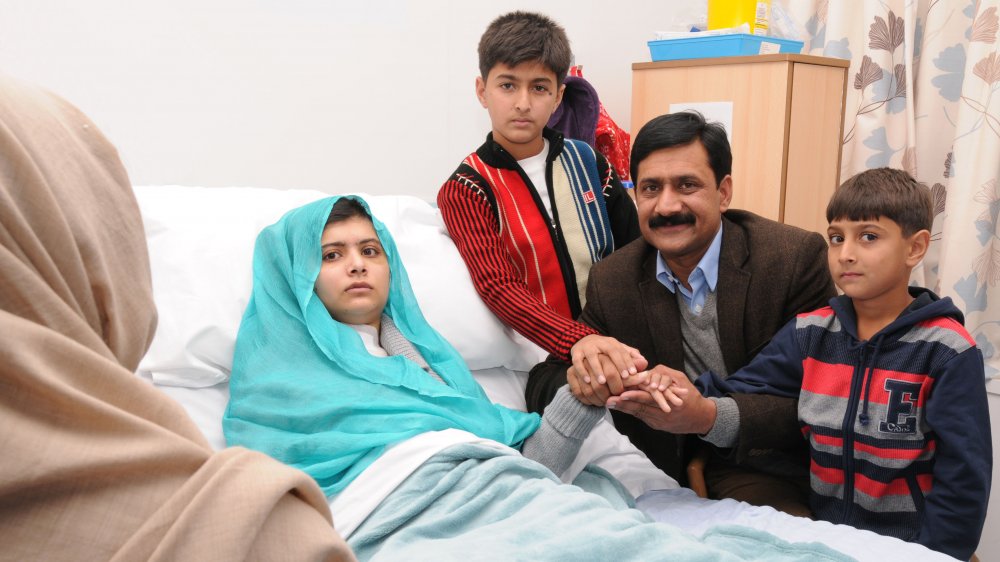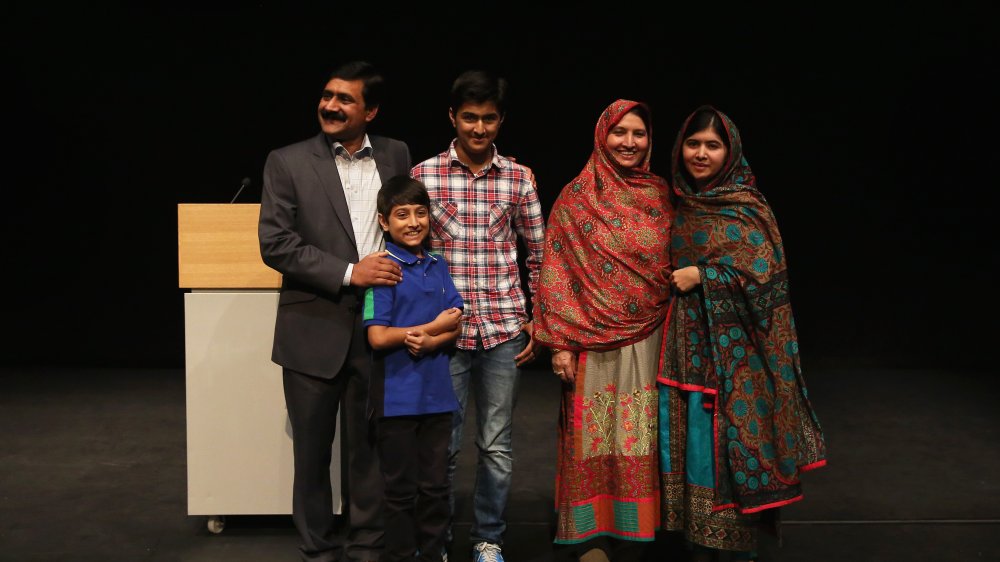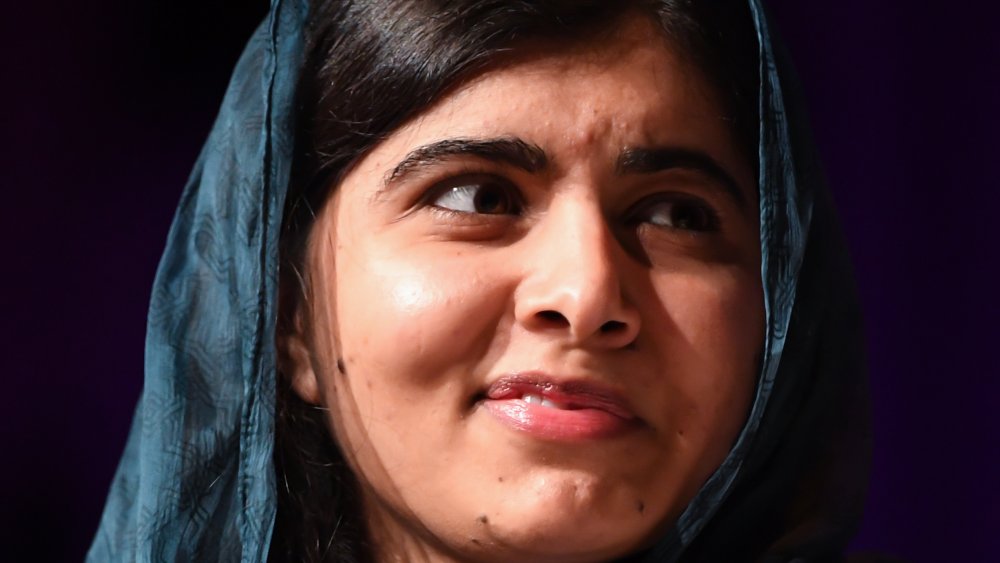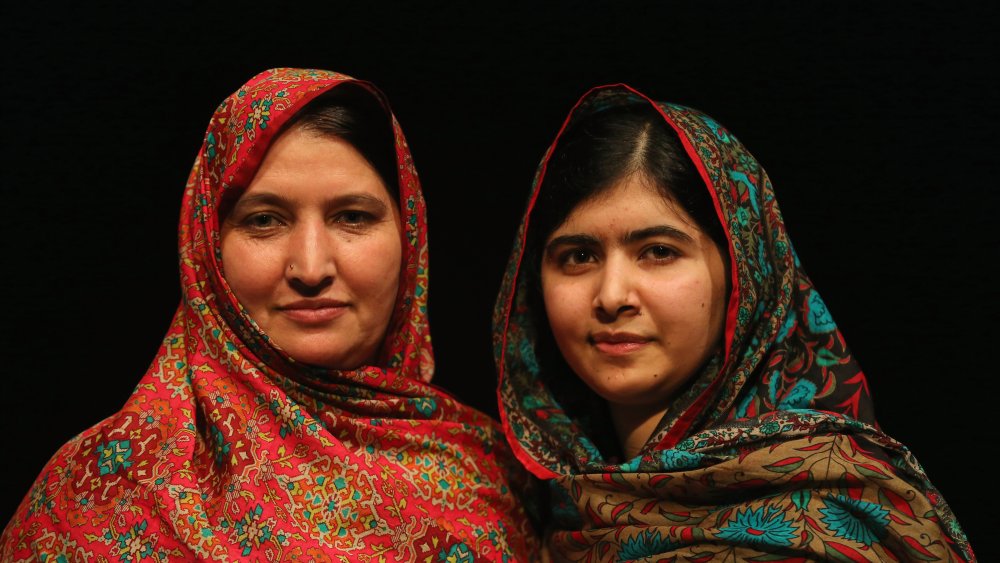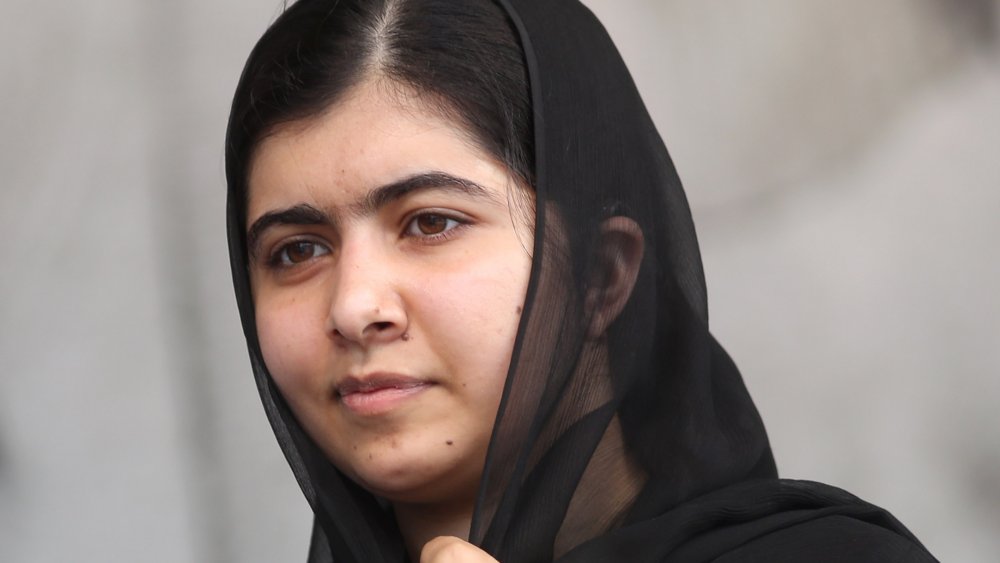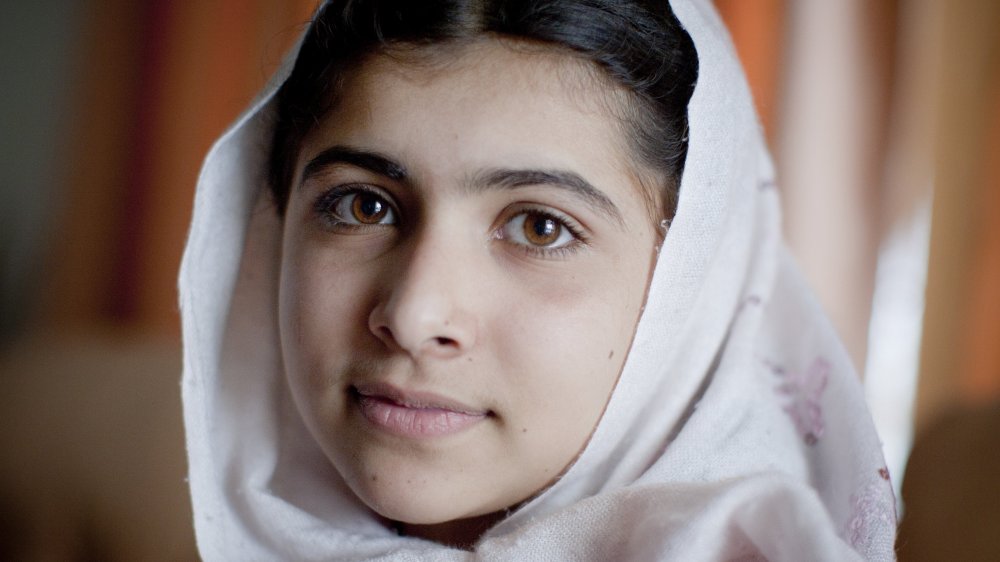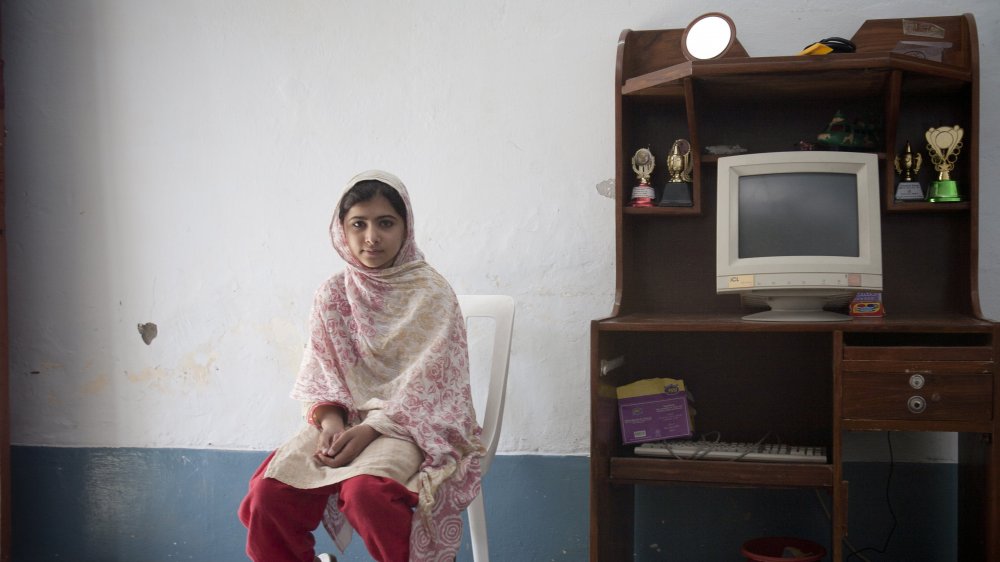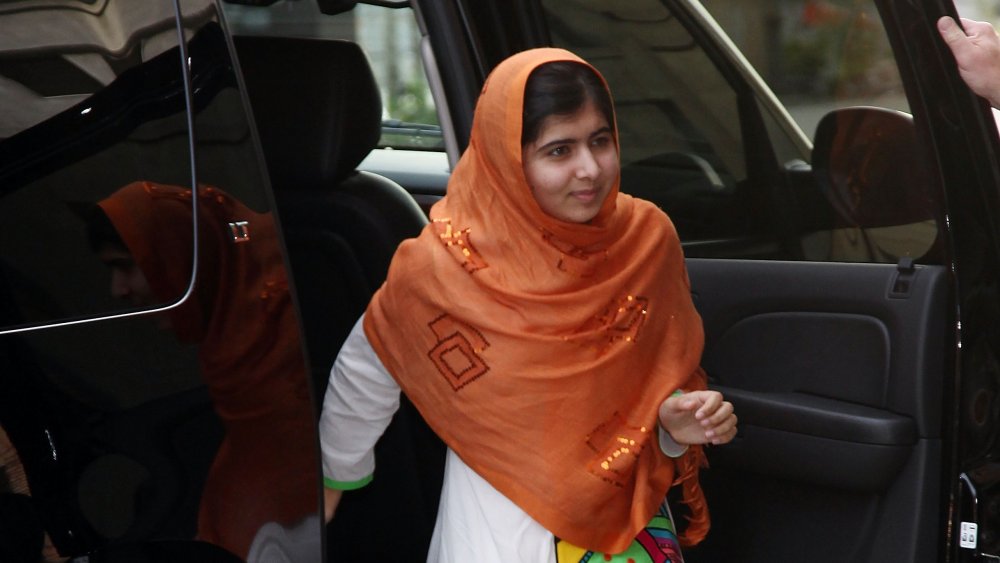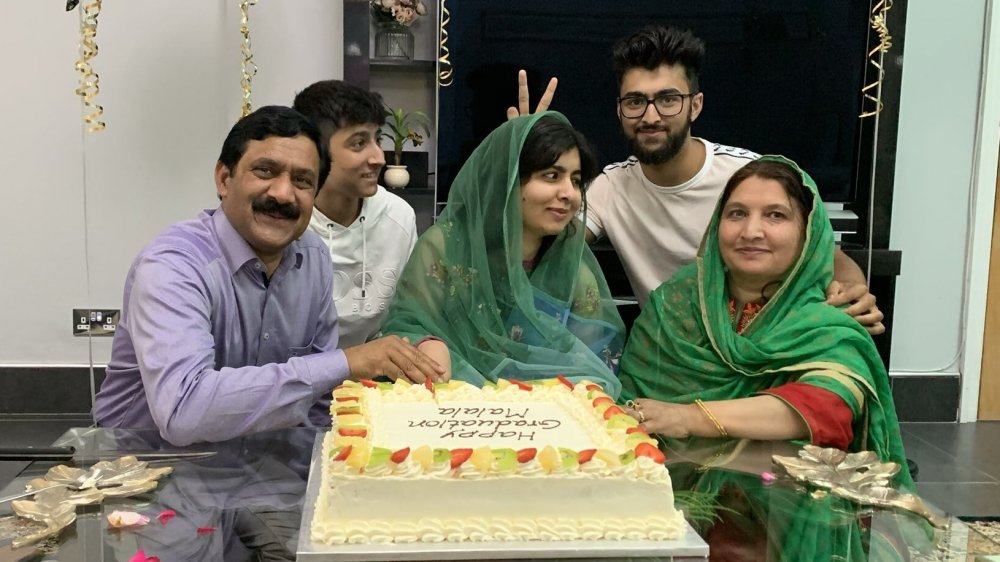The Untold Truth Of Malala Yousafzai
Malala Yousafzai, the young Pakistani activist, rose to fame in October 2012 after a gunman shot her in a school bus for championing every girl's right to education in her homeland. The trailblazer, who has distinctive dark, piercing eyes and a penchant for public speaking, survived to tell the tale, taking the world by storm with her passion for education and gender equality. She eventually became a part of several campaigns, the subject of books and a documentary film, He Named Me Malala (2015) based on her trials and tribulations. She also won the Nobel Peace Prize in 2014 for her contribution to the field of education for children, becoming the first Pakistani to be honored with the award. She was also the youngest person ever to have received the Nobel Peace Prize.
Malala is young but already has had a myriad of lessons and experiences that are incredibly diverse in nature. Her life is complex, inspiring, and filled with plenty of interesting anecdotes. She's both popular and controversial, often at the receiving end of scathing remarks from trolls as well as appreciation from her supporters.
Here's what you should know about her story.
She was born to educators
Historically, parts of South Asia have come under fire for mistreating young girls. In Pakistan, nearly 32 percent of girls aren't in primary school versus 21 percent of boys, as per a report by Human Rights Watch. The number increases to 59 percent for girls who are out of school by the sixth grade: a grim outlook. However, for Malala's parents, it was essential to treat their kids equally. "Me and my wife both grew up in a patriarchal family," Ziauddin Yousafzai, Malala's father reflected in an interview in 2019. "Together, we were able to create and build an egalitarian family."
In a speech at the 2014 TED conference, Ziauddin shed light on the difficulties faced by girls in oppressive societies. "The story of a woman is a story of injustice, inequality, violence and exploitation," he said. "When a girl is born... she is not welcomed, neither by father nor by mother. At the age of five, when she should be going to school, she stays at home." He further spoke about how a girl is perceived to be responsible for her family's reputation.
Ziauddin also reflected on providing girls with the opportunities they need to pursue their dreams. "People ask me what is special about my mentorship that has made Malala so bold and courageous, vocal and poised," he said. "I tell them, 'Don't ask me what I did. Ask me what I did not do. I did not clip her wings, and that's all.'"
Malala blogged anonymously before being shot
While the Taliban controlled her home in the Swat Valley, Malala started blogging about her experiences for BBC Urdu, writing under an anonymous identity, "Gul Makai" when she was 11-years-old. "I had a terrible dream yesterday with military helicopters and the Taliban," she wrote in January 2009. "I have had such dreams since the launch of the military operation in Swat. My mother made me breakfast and I went off to school. I was afraid of going to school because the Taliban had issued an edict banning all girls from attending schools."
Malala wrote about a decrease in attendance at school on account of the edict and how some of her friends and their families had moved away to other regions after the mandate: a major setback. She also mentioned being afraid and uncertain. "On my way from school to home I heard a man saying, 'I will kill you,'" she wrote. "I hastened my pace and after a while I looked back if the man was still coming behind me. But to my utter relief he was talking on his mobile and must have been threatening someone else over the phone."
Her words were honest and heartfelt, a commentary on everyday struggles and life in Swat Valley as a girl who was determined to chase her dreams. Her blog received appreciated and praise for being profound and powerful.
Malala was not afraid to speak up
While Malala was writing her blog for the BBC in 2009, several things were happening all at once. Her father was facing threats and the safety of the whole family was an issue. Malala was getting increasingly concerned and was worried about her dad. However, she didn't back down and stood her ground. "I wanted to speak up for my rights," she told the BBC, musing about her blog. "And also I didn't want my future to be just sitting in a room and be imprisoned in my four walls and just cooking and giving birth to children. I didn't want to see my life in that way." In a CNN interview in 2011, when asked why she decided to speak up, Malala spoke up empathetically and without fear in her voice. "My people need me," she said. "I should raise my voice because if I don't raise my voice now, when will I raise my voice?"
She stood by her views and even appeared on a show with a Pakistani television presenter, Hamid Mir to speak about the issue. By this time, her identity was way more apparent and it became difficult for her to stay anonymous. In October 2012, Malala was shot point-blank by a militant. She was attacked on her way home from school, surrounded by friends. The incident was shocking, unprecedented, and left the whole world speechless.
It took months for Malala to recover from the assault
After Malala was shot, she was left seriously injured and was unresponsive for three days after undergoing surgery, as per CNN. Things started looking up a few days later and she was moved to the U.K. in a bid to treat her at Queen Elizabeth Hospital's trauma center in Birmingham. The facility is known for its expertise with injuries sustained from gunshots. Malala slowly started healing, talking, and laughing, engaging in activities such as writing and reading. Her recovery and progress were closely followed by media outlets across the world.
Nearly three months later, she was able to leave the hospital to continue working on her recovery with her family before undergoing more reconstruction surgeries. Her comeback was celebrated globally as Malala and her family figured out the next steps, knowing that flying back to Pakistan was not an option anymore as the Taliban continued to treat Malala as one of their prime targets, which posed a serious threat to the family. They continued staying in the U.K. and focused on building a new life far away from the place they once called home, unsure when they'll be able to return to Swat Valley.
Malala rebuilt her life in the U.K.
After the attack, the Yousafzais focused on adjusting to their new home in Birmingham. There was a lot to confront: culture shock, language barriers, helping Malala through her recovery, responding to public curiosity around her life, and essentially starting from scratch.
Malala told the BBC (via the Guardian) that she and her mom were particularly surprised by how much more independence women enjoyed in the West compared to their counterparts in Pakistan. There were barely any restrictions in their new home. For example, while women would go about their daily lives by themselves in the U.K., back in Pakistan, the Yousafzais were accustomed to only seeing women step out of their homes accompanied by a male family member.
Malala also reflected on her desire to stay true to her roots and Pashtun culture, choosing to stick to her traditional attire in the West. "I'm still following my own culture – Pashtun culture," she was quoted as saying. Malala also remained focused on her education and attended high school in Birmingham. After that, she pursued her undergraduate studies at prestigious Oxford University.
She doesn't consider herself unique
Malala has often spoken about not thinking of herself as extraordinary. In an interview with National Geographic in 2016, Malala said she was lucky to have the chance to study and voice her opinions. "My parents were always there to say that I have this right to speak, I have this right to go to school," she said. "If other girls in the Swat Valley, including some of my very close friends, had been given this right by their families, we would have been here together speaking out for girls' right to go to school."
Malala believes that she's a reflection of many girls in places like Pakistan where young women are still not granted access to equality and basic rights like education and support from family members. "I consider myself very lucky to be on this platform where I can be the voice of the 60 million girls who are deprived of education, but I think it's very important that children and kids think that their voices are powerful," she added. "It does not matter what your age is. We should believe in ourselves."
Malala's mom maintains a low profile
While Malala has often been seen speaking on public platforms and at events with her dad by her side, her mom, Toor Pekai Yousafzai has remained relatively in the shadows. She opened up about this in an interview with the BBC, looking back at how scary the journey has been for her after her daughter was attacked in broad daylight. "We had to suddenly leave Pakistan. The attack changed everything. We had to focus on Malala's life," Toor explained. "When other people leave their country they accept everything that comes their way and they're ready for it, but we couldn't prepare."
In the same interview, Toor also revealed that she wasn't as active on public forums as her husband and daughter because she was occupied at every stage: first, helping Malala heal and recover after the attack and then supporting her as she wrote her autobiography, I am Malala, which was released in 2013.
Toor spends her days raising her children: Malala and her two brothers. While she didn't get the chance to attend school in Pakistan, Toor has picked up English in Birmingham and even befriended other women like her who are building new lives far away from their home countries. She's a firm believer in treating her daughter like a regular girl and often has to remind Malala to stay hydrated throughout the day and avoid staying up late.
She started an organization to reach out to girls
In 2013, Malala and her father spearheaded a non-profit organization called the Malala Fund in a bid to spread awareness about equal rights and girls' access to education in different parts of the world such as Pakistan, India, Lebanon, Brazil, Nigeria, Afghanistan, and Turkey. The organization hopes to advocate for girls' rights by bringing their voices out into the open.
One of the first high-profile names to support the fund was actress Angelina Jolie who stepped up in 2013 with a generous donation amount of $200,000. The Huffington Post reports Jolie spoke highly of Malala at the Women in the World summit. "All that mattered to Malala was going to school," she said. "Here's what they [her attackers] accomplished: they shot her at point-blank range in the head and made her stronger. The brutal attempt to silence her voice made it stronger."
The Malala Fund crossed a major milestone in 2018: Apple announced its partnership with the organization and declared it would support Malala Fund through tech and curriculum support as well as facilitate research to ensure more equitable access to education.
Most of her attackers were freed
While Malala's attackers were initially sentenced to 25 years in prison in April 2014, things took a strange turn in October that year. The militants reportedly filed an appeal in May after the initial verdict and eight out of 10 attackers were acquitted of their previous charges. Only the remaining two men were convicted. The reasons cited included a lack of evidence against the criminals.
A prosecutor involved in the proceedings, Syed Naeem Khan, expressed his surprise at the verdict in an NBC report. "Like other people, I don't understand why the two were only convicted," Khan said. "Why not all the 10 who had confessed their involvement in the attack on Malala?" Other reports, including one by CNN in June 2015, suggested that the original reports were wrong and the eight men had never been convicted in the first place. This was attributed to a lack of evidence that they were involved in the planning and actual attack. There was, however, enough proof to sentence the other two perpetrators to life in prison.
Malala visited Pakistan in 2018
The Yousafzais finally got a chance to visit Swat Valley in 2018, only several years after the attack due to safety concerns. The trip was a meticulously organized affair, replete with heavy security, a helicopter organized by the military, and restricted visiting hours. It was an emotional visit for Malala who spent some time talking to her old friends from school and walked around the place she once called home. Till that point, it remained unclear whether she and her family would ever get a chance to visit the country again.
"I miss everything about Pakistan... from the rivers, the mountains, to even the dirty streets and the garbage around our house, and my friends and how we used to have gossip... to how we used to fight with our neighbors," Malala said in an interview with Reuters. "I had never been so excited for anything. I've never been so happy before."
She has both admirers and critics
While the young activist has many admirers who look up to her, Malala has faced her fair share of criticism, especially from other Pakistani nationals. Foreign Policy says her critics have pointed out that she is no different from millions of girls in Pakistan, who beat difficult circumstances every day and aren't celebrated for it. They've also wondered what tangible things have been achieved by the activist for Pakistan and why she continues living far away from her homeland if she's a patriot. Conspiracy theorists have also accused her of staging her own assault and being hungry for fame and attention.
In 2014, a month after winning the Nobel Peace Prize, Malala faced a backlash from the All Pakistan Private Schools Federation. They announced an "I Am Not Malala" day, observed on March 30, and asked that her memoir be banned. Many teachers and students from schools across Pakistan openly chanted slogans against Malala.
It's also not uncommon to find posts on social media that slam Malala's actions. For instance, when a picture allegedly of Malala at university wearing jeans and boots went viral, the activist was widely shamed for her sartorial choices. The photo was, in fact, not verified, but that didn't stop naysayers who believed that Malala was being disrespectful towards her culture and Pashtun roots from shaming Malala online.
Malala graduated from Oxford
While Malala has been an activist, an international speaker, and an advocate for girls across the world, she's also been occupied with her own goals such as finishing her education and planning for her future. In fact, in 2020 she completed her undergraduate degree at Oxford University.
In June, she took to Twitter to express her gratitude and happiness on graduating from college. "Hard to express my joy and gratitude right now as I completed my Philosophy, Politics and Economics degree at Oxford," she wrote. "I don't know what's ahead. For now, it will be Netflix, reading and sleep." Malala's tweet received a lot of attention and thousands of comments poured in, congratulating her on her achievement. Her tweet was accompanied by photos of herself celebrating, including a happy picture with her family, marking the special occasion with a cake. Her future plans remain a mystery for now but her association with Malala Fund and her work as an activist are likely to continue.
